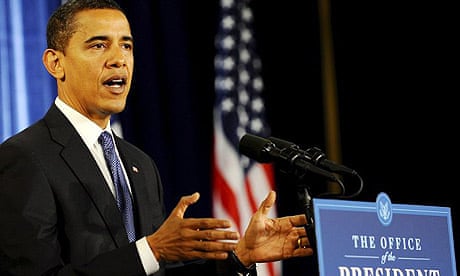Barack Obama's run for the White House was one of the most hi-tech in history, with his campaign team using the internet to spread his message, connect with potential voters and raise funds.
He also backed up his image as a 21st century politician by courting Silicon Valley and pledging to install America's first chief technology officer, an official who could oversee new investment and research and steer the country into the future.
But with less than three weeks until his inauguration, Obama has yet to name a candidate for the post of CTO – something that senior industry figures say should be rectified as soon as possible.
"There's a great desire in the Obama administration to make better use of information technology throughout the government," said Vint Cerf, the so-called "father of the internet" who is now a vice-president at Google.
Cerf, who has previously been linked with the position but has had no contact with Obama's team, said that a high-ranking technology adviser is crucial if America is to recover economically.
"The choice of the term CTO, I think, was very deliberate - and probably extends to a much broader range of technologies than just information technology," he told the Guardian.
Despite the lack of candidate, Obama's transition team is already trying out some new ideas – particularly centred around the change.gov website, where the president-elect already gives regular YouTube addresses and invites members of the public to join policy debates.
However, Cerf and others believe that the changes must go deeper if Obama is to fulfil his ambitions to move to a hi-tech economy.
That is important because – despite Silicon Valley's role at the heart of the internet industry – the access to technology and communications across America as a whole is starkly divided.
In the past seven years, the country has slipped from 4th to 15th place in the league of broadband connectivity, and now trails a number of other countries – including Denmark, South Korea, Britain and France.
In December, Obama highlighted statistics from the Organisation of Economic Cooperation and Development as he unveiled part of his proposed $400bn economic recovery plan.
"As we renew our schools and highways, we'll also renew our information superhighway," he said. "It is unacceptable that the United States ranks 15th in the world in broadband adoption. Here – in the country that invented the internet – every child should have the chance to get online."
Tom Evslin, a former executive at Microsoft and the telecom company AT&T, is among those who think broadband should be a central drive from Obama's White House.
"The benefits of making sure everybody is online are so large that they justify some social investment – just like rural electrification, you want to get to the point where you can assume everyone can make use of it," he said.
An ambitious plan to offer broadband to every home in the country would clearly have a political benefit for Obama himself - playing into the image of a young, savvy, hi-tech president – but it would also bring new opportunities to Americans in isolated rural communities.
Not everybody agrees with such a stance, however. Internet sceptic Andrew Keen recently said that Obama should not consider expanding internet access to everyone because it would give a voice to the poor and unemployed, claiming that to do so would only encourage modern-day fascism.
"Given the way in which we know that the unfiltered internet spreads corrosive lies and inflames prejudice," he wrote. "Why would we want to give all Americans universal broadband access at the very moment when millions of them will be unemployed, disorientated and angry?"
The role of CTO remains one of the last senior posts unaddressed by Obama's transition team, despite announcements about the candidates for high-profile roles in science, energy and communications. Indeed, it is not even clear at the moment whether it will be a cabinet-level position or an advisory role.
According to the ObamaCTO.org website – which lets people vote on the topics they think Obama's technology team should look at first – the topics a successor should address include internet access, privacy and online copyright. Among the site's most popular demands are a repeal of the Patriot Act of 2001 and the Digital Millennium Copyright Act.
But with entrenched lobby groups on all sides and billion dollar industries fighting for their survival, those issues could prove to be more than the CTO is prepared to take on – particularly if Obama chooses a candidate who does not have a cutting-edge industrial background.
"So far the picks have tended towards academia," said Evslin. "I'm worried that there aren't enough people with operating experience; people who have built companies in the last 10 years. Obama needs to convince people they can do great things. Nobody wants to be another bureaucrat."
Cerf believes that the eventual contender will need to undertake a delicate balancing act – but could eventually get the chance to reinvent America's economy and help the country lift itself out of recession.
"It's actually a remarkable opportunity for an individual – but also the US government – to do something in 21st century style which I think Franklin Roosevelt did during the Great Depression," he said. "You know how they say opportunity lies on the edge of chaos? Maybe that's going to be true here too."
